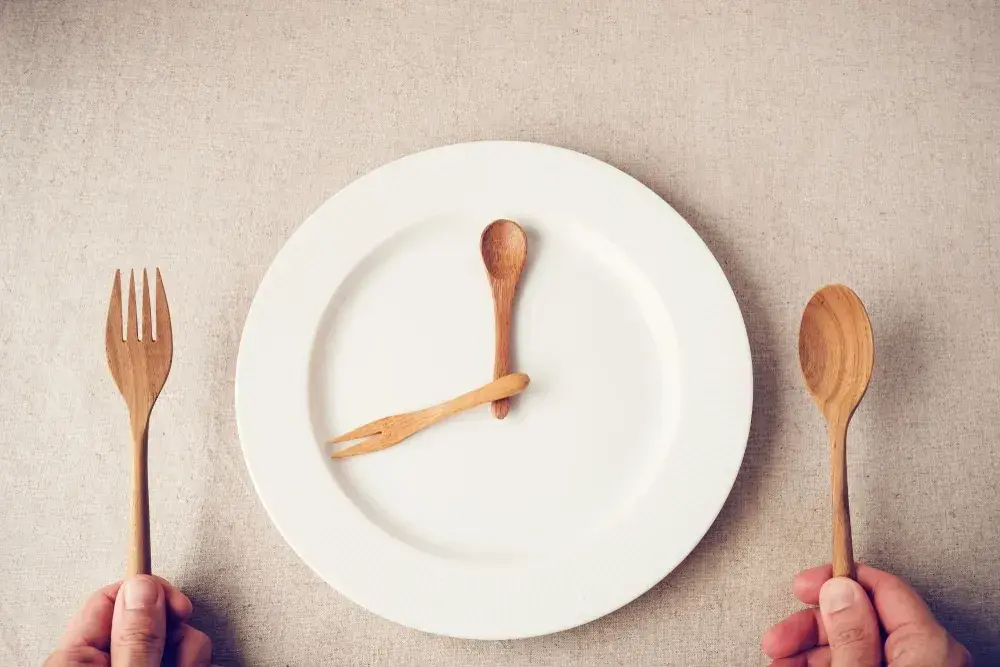
/assets/images/provider/photos/2579251.jpg)
For those who have tried to lose weight on calorie-restricted diets, the idea of fasting is usually not appealing. After all, when you’re hungry and you don’t eat, you feel cranky and tired, and you set yourself up for diet failure.
But fasting doesn’t have to be this way. In fact, today’s fasting techniques don’t involve starvation or unhealthy food restrictions at all. The right kind of fasting has tremendous benefits for both health and weight loss — and it’s very doable!
The problem is, most people simply don’t know how to fast for their body type and weight-loss goals. And if you’re like most people, you’ve likely never learned how fasting can help you and exactly how to do it for the maximum effect.
You can learn how to fast in a way that works for you — no starvation required. Before you learn how to use fasting to improve your health and kick your body into weight-loss high gear, you need to let go of the old fasting stereotypes. These common misconceptions about fasting could be holding you back from your true potential. Let’s put them to rest once and for all.
Myth #1: Fasting means you have to starve yourself or not eat for days
While traditional “fasting” did involve complete abstinence from eating, this is not the type of fasting we use today for weight loss and cellular repair. Here’s what we mean when we talk about fasting today:
You still eat, but you time your meals wisely
Time-restricted fasting, also known as time-restricted feeding, means you eat all of your day’s meals within a certain time window each day. For instance, you may eat all of your meals and snacks between 9am and 5pm. The rest of the day, you consume water as needed for hydration. This allows your digestive system to rest for 16 hours every day, giving your body time and energy to devote to other things. Time-restricted fasting has become popular in recent years as researchers have discovered it’s not just what you eat, but when, that matters. Studies in mice have shown that time-restricted fasting lowers the risk of obesity and health problems when compared with mice that eat throughout the day, regardless of the total number of calories consumed. Meals take several hours to digest, so this strategy allows the body to potentially burn stored fat throughout the night.
You reduce calories on certain days only
Intermittent fasting is a great way to cut calories without reaching diet burnout. As the name implies, the “fasting” doesn’t happen all the time. You simply reduce calories on certain days, but not on others. Intermittent fasting includes built-in breaks from your low-calorie diet. This is typically much easier and more successful than trying to follow a low-calorie diet every day for the long term. This type of calorie restriction has been shown to boost weight loss and lower the risk of diabetes and heart disease in studies on mice and rats. The 5:2 diet is a good example of this type of fasting: you eat normally for 5 days, and restrict calories for 2 days each week.
You cut calories for longer periods, consuming specialized foods that boost your efforts
Perhaps the most effective way to fast for both weight loss and health improvements is prolonged fasting. This technique requires a low-calorie diet for several days at a time — usually 5 days out of the month. During these “fasting” periods, you consume specific plant-based foods that provide you with necessary nutrients that keep your body in a fat-burning, “fasting” mode. The ProLon fasting mimicking diet is a good way to try this type of fasting without the guesswork. The ProLon plan includes a kit with soups, snacks, teas, and specialized electrolyte beverages that you use during your 5-day fast to get the maximum benefits. ProLon has been tested in clinical studies and is designed to boost weight loss, including loss of abdominal fat, as well as induce a powerful cellular repair in the body that can reduce signs of inflammation and aging.
Myth #2: Fasting is only for people with stronger willpower than me
The traditional “starvation” style of fasting is difficult because it requires no food for an unspecified amount of time. But healthy, scientifically tested fasting techniques don’t require you to go without food for days. Instead, you utilize the benefits of fasting for your own body type and needs, and follow your fasting plan as directed by a health professional. This means you get all the weight loss and amazing health benefits of fasting without the difficulty of foregoing food completely. While fasting may not be considered “easy,” the results are well worth the effort.
Myth #3: Fasting is just a “fad”
Fasting has been used for centuries for health purposes, and researchers are finding more and more reasons to use fasting for both weight loss and disease prevention. It doesn’t require you to consume the “food of the moment” or to follow trendy diet recommendations such as “no fat” or “protein only.” Instead, it utilizes the natural power of the human body’s metabolic processes through a simple yet effective practice that has stood the test of time.
Myth #4: Fasting isn’t good for you
Quite the contrary: research continues to show us the benefits of well-designed, physician-approved fasting techniques. The changes induced in the body from fasting offer a number of health benefits, from better glucose control to lower risk of heart disease. You simply need guidance from a health professional on how to fast for your body type and health needs, and you’ll be able to harness this powerful potential for yourself.
Myth #5: You just gain the weight back after you’re done fasting
Proper fasting has the ability to set off a complex fat-burning process in the body, but this is only achieved if you do it correctly. Fasting can — and does — deliver lasting results if you do it right. A plan like ProLon gives the body adequate time to make these changes and to start an anti-inflammatory response that can help you lose weight, keep it off, and reduce your risk of certain health problems.
Are you ready to see what a healthy 5-day fasting diet could do for you? Learn more about ProLon and get the facts on the amazing benefits of fasting!



